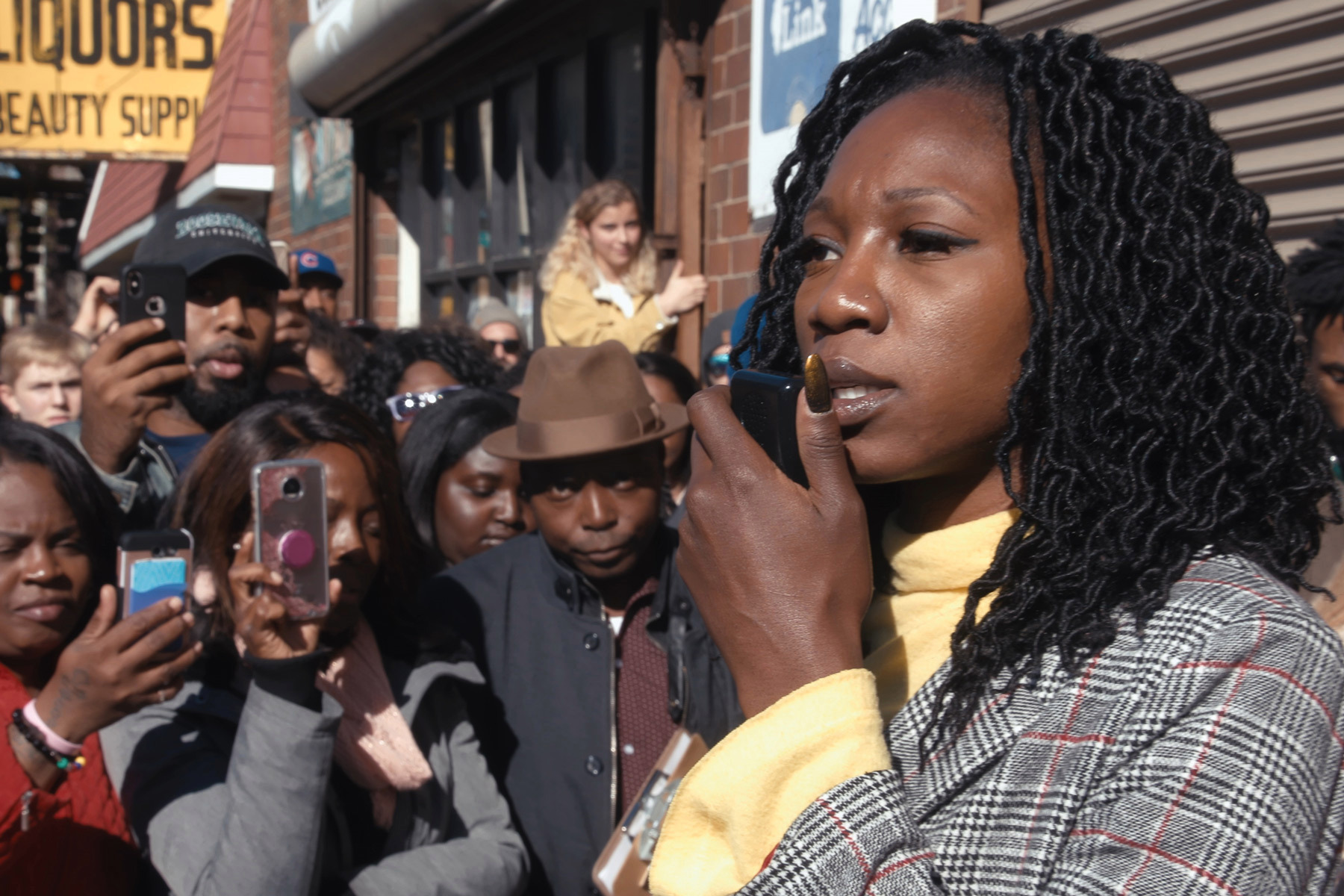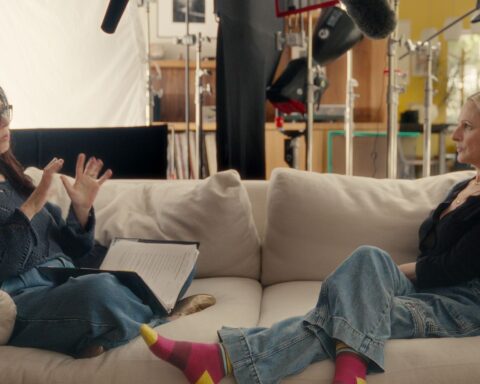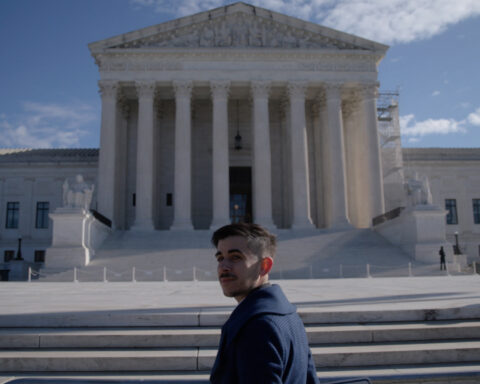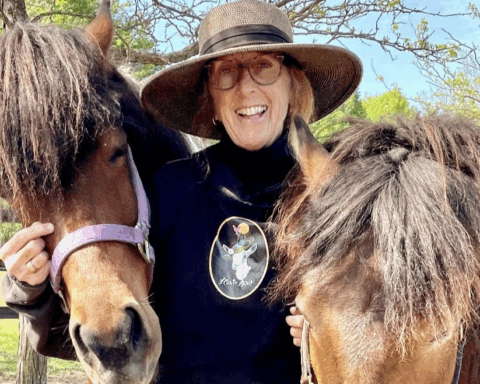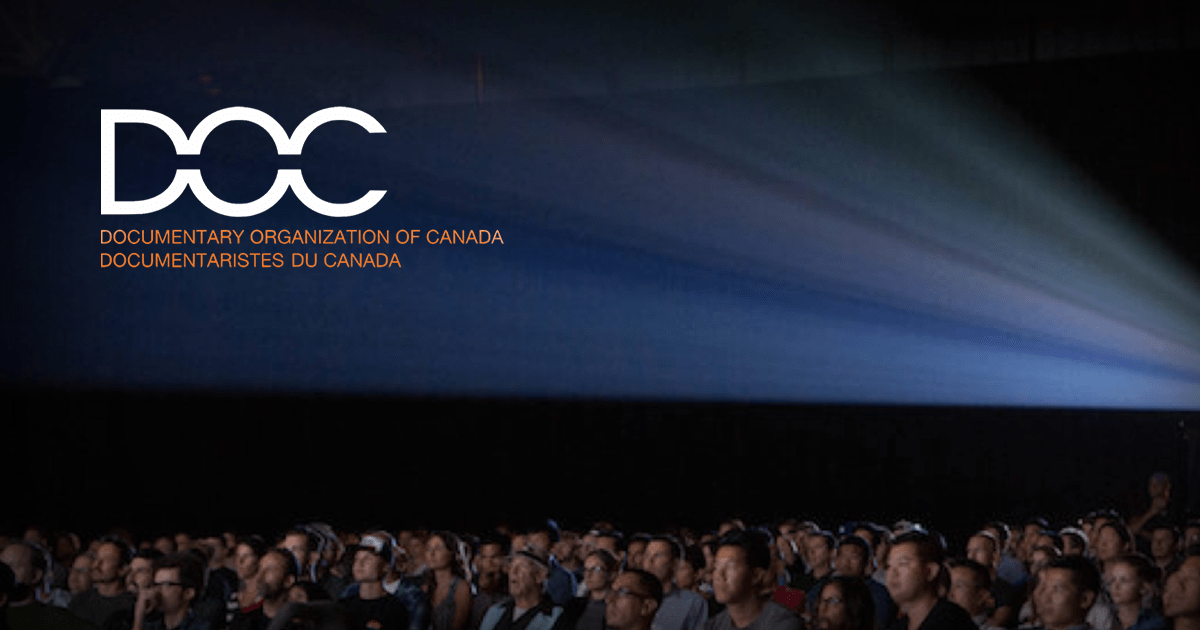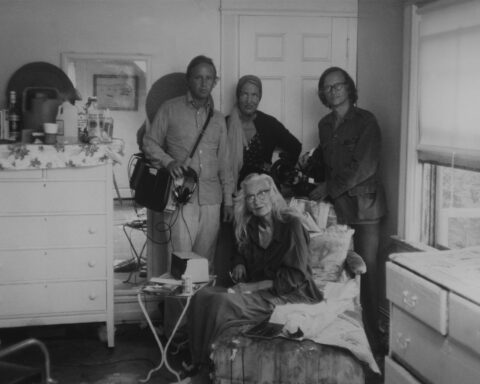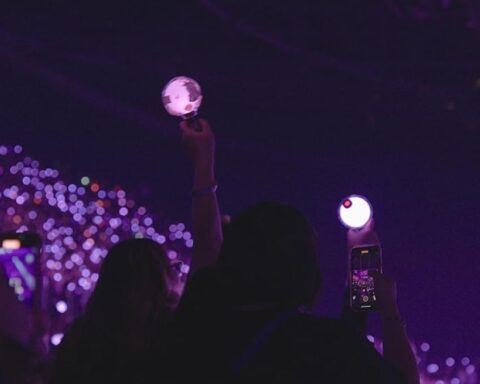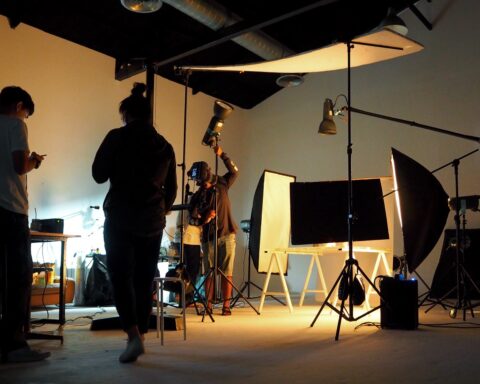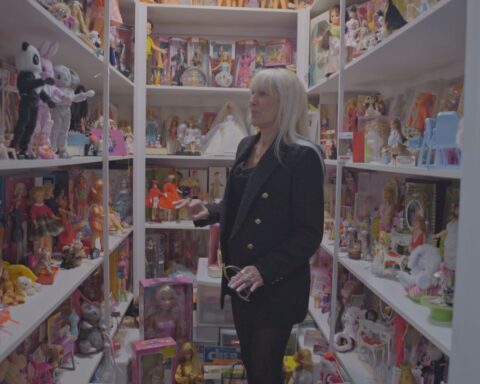For decades Steve James has been telling remarkable stories about the people in and around his adopted city of Chicago. With Hoop Dreams he captured the raw stories of two young NBA hopefuls, and the structural and personal challenges that surrounded them. The Interrupters provided a poignant look at heroic violence de-escalators, while the emotionally devastating Stevie about a troubled young man who James had tried to help as a “big brother,” proved to be one of his most personal films. James provided a fascinating take on the 2008 financial crash with Abacus, and offered cinephiles a wonderful, nuanced look at the giant of film criticism, Roger Ebert, in Life Itself.
James’ latest film, City So Real, told in four hour-long episodes, traces the sheer madness, and contradictions inherent in Chicago’s mayoral election season. It’s a remarkable work by a remarkable filmmaker, deftly balancing the intimate and the grand. All of the facets of his previous subjects, from the raw thrill of sporting competitions to the complexities of the socioeconomic situation of his hometown, are at play here, with the focus on the campaign allowing a broad, unprecedented look at the charms and challenges inherent in his beloved city. Sprawling, sophisticated and yet deeply focussed, this is a master work of precision and scope, and an instant classic in the political documentary genre.—Jason Gorber
POV spoke to James by phone prior to the film’s virtual Hot Docs premiere.
POV: Jason Gorber
SJ: Steve James
This interview has been edited for brevity and clarity.
POV: I think your film is extraordinary and explores deep truths, some uncomfortable, about your home city of Chicago. Can you talk about the journey of bringing this story to life?
SJ: This is something that I’ve wanted to do for a long time. I’ve been in this city for many decades. I thought it would be cool to do a film about Chicago that’s a portrait. Going way back to my grad school days, a Chris Marker film, Le Joli Mai, impacted me. My film isn’t that—Marker’s a poet, I’m just a filmmaker—but I did take some cues from what he did in Le Joli Mai. It’s a film in which he made a portrait of Paris at a crucial moment coming out of the Algerian conflict. The war is sort of the spine of the film, but it ventures far and wide. Marker talks to people—he has vérité scenes mixed with interview scenes—and it’s an interesting smorgasbord. He’s got these beautiful sequences that are like personal photographs of Paris. I thought, I’d love to do that, but at the right time for Chicago. It dawned on me with the mayoral election that we just had, coupled with the Jason Van Dyke trial [involving a white policeman killing a Black man], that this might be the perfect moment to do a portrait of my city. Chicago finds itself, like most of America, at a crossroads politically. Things are in a very weird place. Violence and [bad] police relationships in the Black community are not unique to Chicago. City So Real has turned it into a 4-hour monster instead of just a stand-alone film because I couldn’t help myself.
POV: Let’s talk about you not being able to help yourself. Was the original intention to follow the story and make a traditional theatrical three-hour Steve James work? It’s four episodes, but it could be 15. Does the scope have to do more with marketplace or aesthetics?
SJ: I certainly set out to make a stand-alone film. I thought it would be two hours, maybe. I wasn’t thinking three. There were a lot of things going on, which I anticipated would make for quite a free-for-all of a campaign with all of the candidates. I figured the trial would be significant. Then there were all of the other things that happened that I didn’t anticipate, like the Chicago alderman getting indicted.
It just kind of mushroomed and at a certain point, and I told Diane Weyermann, the Chief Content Officer at Participant Media, that this may want to be a mini-series! I had just done the America to Me miniseries that was nine episodes long. Participant had partnered with me on that and we had a great working relationship. I showed Diane a cut of City So Real and she said, ‘yeah, I see it, you should get on with it.’ The marketplace dictates that you can’t put out a 4-hour film, and given where things have gone with docuseries being a very viable format these days, it just came to be natural to turn it into that. It doesn’t have cliffhangers at the end of each episode like a lot of those murder docuseries, however.
POV: Your film evokes David Simon, and what he does episodically in his fiction works, especially Season 4 of The Wire which is about a mayoral election. In the same way as your documentary, his television shows are not episodic in the traditional sense, but they’re certainly chapters. Your films felt like four chapters of a whole.
SJ: I will take that analogy any day. The Wire is my all-time favourite TV series and season four is my favourite season. So there you go. When I did The Interrupters, I felt like I was living inside a season of The Wire! I think part of what appeals to me greatly about what Simon does is that he tells very human stories of people in a larger framework of institutions. They’re very complicated looks at the world we live in. And I’m certainly a sucker for that.
POV: Many of the stories you follow take place at the same time. Did you have different crews to follow the separate storylines?
SJ: It’s funny, with America to Me, I did a 10-hour series on a single high school and we had multiple directors. For this portrait of the city of Chicago it was just me, my son and Zak Piper, who’s a long-time partner of mine, both as producer and sound recordist. It was mostly just the three of us shooting this, and we were very busy. We attempted to embed to some degree with a number of the candidates. I wasn’t interested in doing what I perceived to be a more traditional documentary political film where you’re just embedded with one candidate and they either win or they lose. I wanted the specificity of intimate access, but I wanted a bigger picture of politics as it plays out in a city like Chicago, both institutionally and as the blood sport that it is. I was just fascinated by the fact that there were so many different people who believed they could be mayor of Chicago.
The cross-section of candidates is like a cross-section of Chicago, and they was such an interesting group of people. I didn’t want to privilege one over the others if I could get access to all of them. There were a lot of days when we got up and knew we were going to follow certain things. Other times, we might have one thing on our agenda for the day like a press conference, or we were going to be with a candidate for part of the day. The beauty and the fun of it was that we didn’t know where we’d end up by the end of the day. That was very Chris Marker-ish, and we were very serendipitous about wherever the story took us. And whatever neighbourhoods it took us.
We met some really interesting people on the way, like the older couple at the voting site, who were married and in their retirement home. We just happened across them and started talking and found that they were fascinating. Or the Lyft driver, who I was mostly fascinated with because she seemed to be politically engaged and had this funny Care Bear costume on. Then it turned in this other direction, where she revealed something that I think is tragic about what this country is for someone like her. We let the stories take us where they took us, to some extent, but we also planned certain things, too.
POV: There are many moments where it’s clear that people are behaving in unguarded ways. How are you able to gain their trust, while still being able to float above the story and not become so intimately connected with one character that you’re letting that sway your journalistic integrity?
SJ: I think that one thing I’ve found, because I’ve been doing this for a while myself, is to approach situations in a more intimate fashion. I approach shooting with a very small crew. It was rare to have more than two of us out. If I was shooting, then Zack was doing sound. It became clear quite quickly that my son Jackson likes to shoot things and not have me over his shoulder. He was doing good work, so I was like, ‘hey man, I need you to go there’ by yourself. I do think the intimacy of the approach yields intimacy from the subjects. Also, I use humor with people. I find that when people enjoy your company, they also let your guard down, and I don’t make a big deal about what I’m doing.
I’m also really clear with people about what it is I’m interested in. With the dinner party scene in the really nice high-rise apartment, I worked with Christy Hefner, who was hosting it, on the ground rules. I told her that I wanted to hear from people in her world, and I knew she had these kinds of dinners, and it would just be great to eavesdrop on one of them. Of course I wanted the guests to talk about the election and Chicago, not just get off on some tangent that would be unrelated to what we were making, but those were the only ground rules. I showed up and was just friendly—it was me and another sound guy. They kind of went with it, and I didn’t have to do much in terms of anything, and I don’t remember steering them in any particular direction..
It’s the same with the barbershop. I went with the intention of filming the people that worked there to tell me about Harith Augustus, who had been killed by the cops and to humanize him, to get who he was. Suddenly the documentary gods smiled, and this postal worker wanders in to get his hair cut for the first time at that shop, and this incredible conversation happens. It had nothing to do with me! [laughs]
POV: There are so many moments in this film where people, even when they acknowledge that you and the camera are there, seemingly don’t care. Are people unafraid to express their opinions now because they’re so used to social media?
SJ: I think there’s some truth to that. People are much less daunted by a camera. Everyone’s a filmmaker now in a sense, everyone’s documenting their lives.
POV: You’re a filmmaker who’s asked people questions on camera for decades. Do you think we’ve just stopped giving a damn about pleasantries, where if I have something to say, no matter how “incorrect,” I’m going to tell you this to your face?
SJ: I think it depends on who you’re talking about. Obviously Trump is that person. Whatever’s in his mind, he will just say it. But I do think that people in positions of authority, who feel that they have something to lose by revealing too much of themselves, are even more guarded because of the way society is. They’re much more savvy about this stuff. It used to be you’d go in to do a documentary, and the people you shot didn’t know what they were getting into. There are a lot more people who have some sense of what’s going on and want some control over it.
America to Me – Official Trailer – Starz from Kartemquin Films on Vimeo.
When we did America to Me, kids didn’t want to talk to us about dating. I tried! One of the kids we were following, and actually doing a lot of filming with: I kept trying to get her to let me film with her and her boyfriend, and he wanted to do it, but she didn’t want to. She said, ‘what if I’ve broken up with him by the time this comes out?’ She didn’t want to have that be permanently out there about her in this relationship. Things are for forever now.
But I also think you’re right that people, in general, are not as intimidated anymore about the camera. So sometimes that manifests itself with performance – “I’m going to tell you what I think!”—and sometimes it manifests itself along the lines of being even more careful and guarded. Are you watching The Last Dance, the Michael Jordan doc? There’s that moment where Obama is criticizing Michael Jordan for not getting behind Harvey Gantt, a Black candidate in North Carolina. That is the most weak-kneed criticism. It’s just, like, come on, man! You can be a little more angry. Obama was that kind of guy. He was extremely careful, very much the anti-Trump in that regard.
So I do think it cuts both ways. I’ve found over the years that I’ve had good luck with people and I do think that a big part of that has been that I work with people that are likable. My crew, the people I work with are likable people. We don’t come in making a big deal of what we’re doing, and we really try to intimately connect with people in a way to just make it fun and something they would want to do, not something they feel obligated to do.
POV: I never knew whether Hoop Dreams made you fall in or out of love with basketball more than when you started. Does this leave you more or less cynical about politics in Chicago?
SJ: One of my all-time favourite comments about Hoop Dreams was from someone who said to me that when they were watching the film, there were times when they just constantly went back and forth between trying to decide whether basketball was good for these kids or was the worst thing for these kids. And I was like, yes, that’s right.
POV: “There’s my movie.”
SJ: There it is. There is no easy answer to that. And with this, I do love the city of Chicago, but I don’t feel like I’m a naive lover of this city.
POV: You’re not so much into blindfolds.
SJ: I love the spirit of the place. I love the people. I’m also horrified at the violence and despairing at the amount of segregation in this city and all of its problems. But there is a spirit here, and it is the birthplace of community activism in America. I think you see that in this film, and you see the kind of way in which people engage here. You’ve gotta love the city for that.
POV: And yet 26% of the electorate came out to vote? For me, that is the most appalling, nightmarish situation, where you have lots of people screaming, lots of people upset, and nobody doing the one thing that might actually make a difference.
SJ: Well, yeah. One of the things I think we found is that outside of certain more liberal and activist circles, white people were not terribly engaged by this election. The Black community was way overrepresented in terms of engagement in this election. The community recognized that the next mayor of Chicago was going to have a profound impact on issues such as how many Black people would leave the city, where the money gets spent, violence, police, etc. It’s like when we’re asking about the Van Dyke trial in that nice park on the North side, and people were like huh, oh yeah, trial. They’re not even engaged with what is probably the single most important trial in Chicago in decades. They’re not even engaged by it because it doesn’t affect them. So who becomes the mayor doesn’t really matter to them.
POV: On a fundamental basis, do you still consider yourself an optimistic filmmaker?
SJ: I’m a humanist filmmaker. That’s what I consider myself. It’s like categorizing David Simon. Is his work pessimistic? Well, it is in a way, as it’s pessimistic about institutions and about what we can really change. But one of the things I love about his work is that he finds and tells the stories of people within that system, good people who are trying to do right and who are worth remembering. I hope that’s what I do. I’m interested in people at crossroads and I’m interested in people’s lives, so I’m a humanist. That keeps me on an optimistic end of the scale than I would be otherwise. I think if I just think about progress on the social, political, cultural front, then I would probably be a good deal more pessimistic.
POV: You’re certainly not an ideological filmmaker, I think that’s fair to say. I don’t think there’s anything propagandistic or polemical about it in the best sense. You’re letting people tell their stories and allowing them to do that. Nonetheless, when you’re cutting it, you’re obviously shaping their stories and making them look at a given time more mayoral or more ridiculous. Could you talk about how you threaded that needle, to avoid “gotchas”?
SJ: I really am not a fan of gotcha. Here’s one way in which it relates to someone very specifically in the film. When Toni Preckwinkle entered the race she was the prohibitive favourite to become the next mayor of Chicago. She had the track record, she had the power, she was part of the Democratic machine, and she was also considered a progressive. She kind of had it all. Everyone said oh, she’s going to be our next mayor. She made it to the runoff, only to then to get crushed by Lori Lightfoot. We didn’t get access to Toni Preckwinkle in the way we got to other people, but it didn’t matter. We showed up and filmed events that she was part of, and went to press conferences and just did the things that we could do. One of the things that emerged was that she’s not a good campaigner. [laughs]. She’s just really not cut out for it. So in the editing, we had to do what we could to make sure that we didn’t just show her in a negative light, that you would see that she had her supporters, and that she had people who were for her, and that she had good intentions. We had to make sure of that because some of the early cuts of it, people would just be like, oh my God, Toni Preckwinkle! I would see, oh, it’s really that bad, and let’s see what we can do about this.
POV: Preckwinkle clumsily reading her notes is just mind-blowing. If you would have shown that four more times, it would have been too much. And I’m sure every time she went somewhere, she had to read off the goddamned notes.
SJ: Yeah. But to get back to your question more directly, when you get into editing, you find that you’re distilling many, many hours of material and trying to craft something that reflects hopefully the complexity of what you captured. It’s the worst when you tip an audience into an easy judgement about somebody. I hate when people sit in audiences, especially for documentaries, arrive at easy judgments about people and ridicule them. I hate when filmmakers do it, and I hate when filmmakers aren’t able to prevent the audience from such easy judgments.
POV: How different do you think this film is going to play for those that don’t know who wins the mayoral election?
SJ: I think it actually plays better.
POV: I agree.
SJ: You know what? This is America. You’re not in America, but I’m in America. If you asked me the names of big city mayors in a lot of places, I’d be, like, ugh. A lot of people don’t know who won and that’s fine. It’s also fine if you do know because it really was an extraordinary election in the sense that no one gave Lori Lightfoot a chance. She came out of nowhere, very late in the game, just the way we show it. She climbed in the polls, and then surprised everybody. Everybody. If you know it, you can sort of see how it happened, and if you don’t know it, you get to ride along and wonder who’s going to become the next mayor of Chicago.
City So Real screens at Hot Docs’ online festival.




